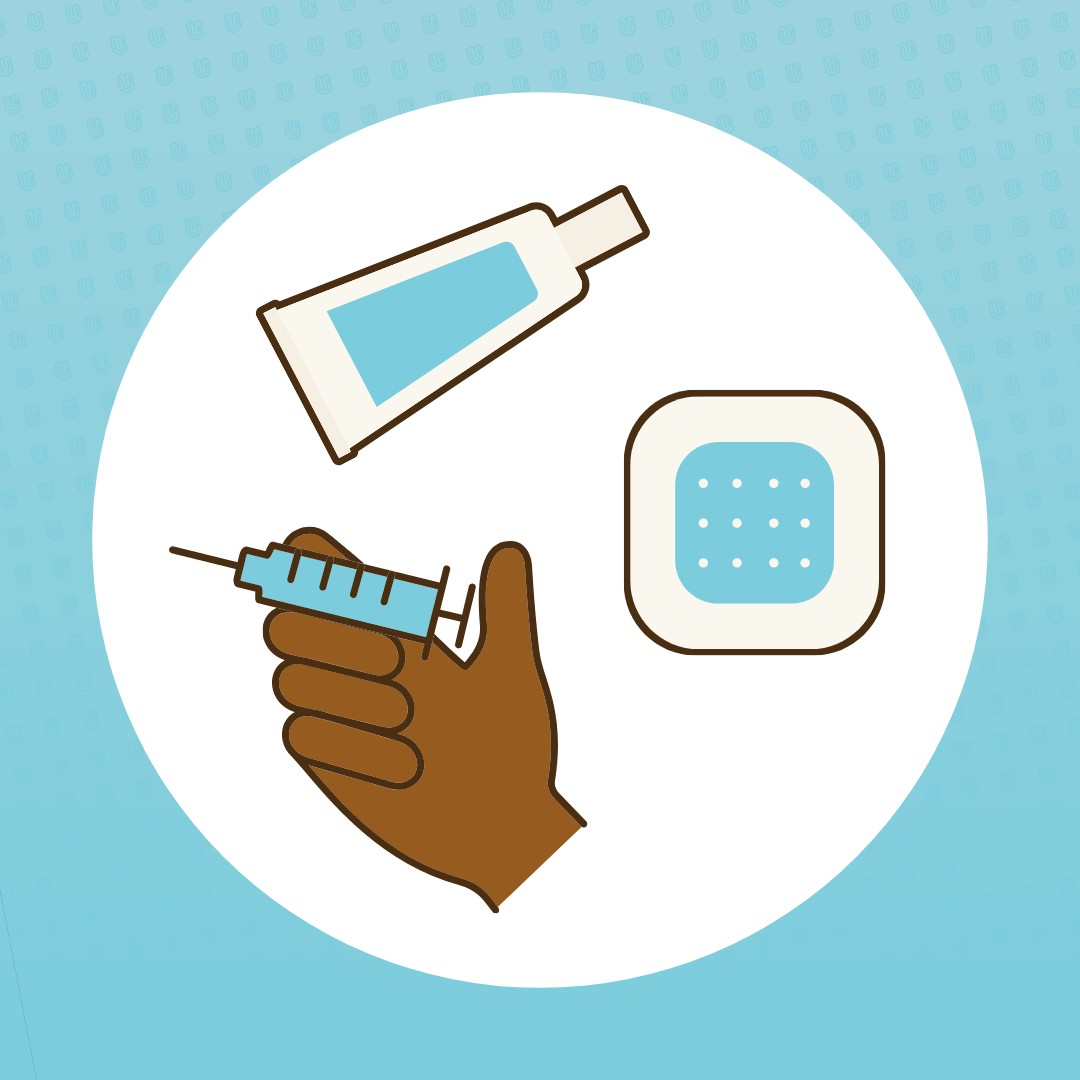For many transgender and gender non-conforming people, undergoing hormone therapy can be life-changing in the best of ways.
Gender dysphoria, or the feeling of a disconnect between one’s assigned gender and how they personally identify, is something that a lot of trans and GNC people contend with. Hormone therapy can play a huge role in easing that discomfort.
But hormone therapy is a big commitment, requiring a lot of research and planning beforehand. Here, we answer some of the most frequently asked questions about transgender hormone therapy – use this information to decide if it’s the right path for you!
The Basics Of FTM Hormone Therapy
Hormone replacement therapy (HRT) goes by many names, including cross-sex hormone therapy and gender-affirming hormone therapy. For transgender men, it is more specifically called female-to-male (FTM) or masculinizing hormone therapy, as the process changes the level of sex hormones in your body to make you look and feel more “masculine”. Through masculinization hormone therapy, someone battling with gender dysphoria can feel more at home in their own body and more at ease around other people.
Undergoing masculinizing hormonal treatment is not unlike typical male puberty. Over the course of 12 months to 24 months, you develop "masculine" secondary sex characteristics, such as increased facial hair and a deeper voice.
We’d like to point out, however, that medical affirmation is just one dimension of gender affirmation – not everyone who identifies as trans or gender non-conforming feels the need to go through it. Other gender-affirming actions include changing one's name and gender marker on official documents.
How Do Female-to-Male Hormones Work?
Sex hormones are what aid in the development of your sex characteristics, like your genitals, breasts, pubic hair, etc. Most people are familiar with estrogen and testosterone, but there are actually three kinds – androgen (which includes testosterone), estrogen, and progestogen.
In cisgender men, testosterone is responsible for things like muscle-building and strength, facial and body hair growth, fat distribution, libido, and the production of red blood cells. In a sense, it's the "masculinizing hormone". Women (or those who are assigned female at birth) produce testosterone too, but not usually at the same level as men.
So if you're assigned female at birth but identify as trans or transmasculine, you can take testosterone treatment (also known as T) to change the levels of testosterone in your body. You can take testosterone either via subcutaneous injection or transdermal application using skin patches or gels.
Your health care provider will determine the dosage and type of testosterone that's right for you, based on an assessment of your overall health, hormone levels, gender goals, risk factors, and what is affordable and available to you.
What Happens To Your Body On T?
Testosterone can produce changes in both the mind and body. For the former, it can ease anxiety and depression and reduce gender dysphoria. As for the physical changes, here's a rough timeline of what you may experience on on T:
The First Three Months
During the first three months of masculinizing hormone therapy, you may notice your skin becoming coarser, oilier, and more prone to acne breakouts. Your body odor and urine may smell differently as well.
You'll also experience increased growth and thickening of body hair, especially on your arms, legs, abdomen, chest, and back. Around this time, you'll notice changes in your muscle mass and fat too, with more fat distributed to your abdomen than your hips.
You'll also notice certain changes in your sex drive and your genitals. Typically, taking T can enlarge the clitoris by a few centimeters and cause vaginal dryness. You're also likely to experience a heightened sex drive.
The First Six Months
One of the most noticeable changes with female-to-male hormone treatment is the change in the sound of your voice. In the first six months, you'll notice your voice cracking and deepening. However, it can take up to a year for your voice to finish developing.
It is within the first six months on T that transgender patients experience changes in their menstrual cycle as well. While testosterone therapy doesn't make you infertile (your body still produces estrogen, after all), it does stop your monthly menstrual periods.
The First Year
For some transgender patients, one of the most exciting things about taking testosterone is gaining the ability to grow out their facial hair. This may require a bit of patience, however, as it can take one to four years for transgender men to fully grow out a beard or a mustache.
On the other hand, one of the lesser-known and dreaded changes one can experience on T is hair loss, particularly around the temples and crown of the head. If male-pattern baldness runs in your family, you may have to deal with losing your hair after a year on T. Unfortunately, this cannot really be controlled.
Typically, the effects of testosterone happen within the first 12 months to 24 months of taking it. Other changes you may experience on hormonal therapy include:
- Changes in face and jaw shape from round to more angular
- Increased bone strength and bone mineral density
- Enlargement of hands and feet
- Increased appetite
- Emotional changes such as a shorter temper, irritability, and lethargy. This changes at different stages of the T cycle.
Testosterone affects everyone differently. For some, the changes come on rapidly. For others, it may take some time to see or feel any noticeable differences. It's important to remain patient throughout the process and avoid comparing your progress to others.
How Long Do You Have To Keep Taking T?
While transgender men can feel satisfied with their bodies within the first two to five years on T, it doesn't mean that they can then just stop taking it. To maintain their testosterone levels and all the changes that have come from being on T, trans men will have to continue hormone therapy for the rest of their lives.
Are These Changes Permanent?
Some trans men may choose to stop their testosterone therapy, whether for health reasons or in order to get pregnant. If you decide to stop, you can expect to lose some muscle, see your body fat come back, and have regular periods again. However, there are changes that are not reversible, such as clitoral growth, deepening of the voice, hair loss, and facial hair growth.
Are There People Who Can’t Take Hormones?
Unfortunately, female-to-male hormone therapy isn't safe for everyone. If you are currently diagnosed or have a family history of any of the following medical conditions, testosterone therapy may have adverse effects on your health:
- Breast cancer: Studies have found that higher levels of testosterone can increase the risk for breast cancer.
- Heart disease: Taking testosterone increases red blood cell count (polycythemia) and overall cholesterol levels. If you have a family history of high blood pressure or heart disease and want to go on T, you will have to have a discussion with your doctor about how to do so while taking care of your heart.
- Deep vein thrombosis or pulmonary embolism: With higher levels of red blood cells, your blood becomes thicker and more prone to clotting. Thus, there is a greater risk for related illnesses.
Transgender patients on testosterone treatment may also experience side effects like weight gain, sleep apnea, elevated liver function, and mental health issues, especially if they're prone to psychosis and mania.
Additionally, if you are pregnant or want to get pregnant, you will have to hit pause on your treatment, as testosterone can cause birth defects to a fetus. If you are on T and you do get pregnant, consult with your health care practitioner immediately.
Preparing For Hormone Therapy
Because testosterone can affect the body in so many different ways, you need to consult with a healthcare professional before starting hormone therapy. Here's what you can expect during your evaluation:
- A physical exam
- An assessment of your personal and family medical history, record of immunizations, and history of tobacco, alcohol, and drug use
- Blood and urine analyses to give your doctor a better assessment of your blood sugar levels, blood count, lipids, liver enzymes, etc.
You can also expect to be asked about any desires to conceive in the future and concerns about fertility.
Depending on where you're from, you're likely to be required to undergo a mental health assessment before you start cross-sex therapy. A mental health care professional will ask you questions about your gender identity and how it affects how you view yourself and your body, your relationships at home, school, and/or work. This assessment will help doctors make sure you're mentally ready to go through a big life-changing decision like hormone therapy.
4 Myths About Being On Testosterone
Unfortunately, there are a ton of harmful misconceptions about testosterone treatment. Here, we dispel four of the most commonly held myths about masculinizing hormones:
Testosterone Changes Your Personality
Many people believe that testosterone can make you more aggressive and violent. But in most cases, people who believe in these kinds of effects are confusing T for steroids, which do induce a kind of "roid rage" in those who abuse it.
If you stick to a plan with a health care practitioner that specializes in transgender hormone therapy, you won't ever go beyond reasonable and healthy testosterone levels. Yes, taking T can induce irritability and mood swings, but this can also be because your body is adjusting to the change in hormone levels. In fact, a study found that cisgender men with low testosterone reported better mental health after starting hormone therapy.
Testosterone Stops You From Getting Pregnant
Being on masculinizing hormone treatment does not prevent pregnancy. While long-term use can stop you from ovulating, and thus stop your period from coming every month, it doesn't make you completely sterile. If you still have your ovaries, your body will still produce estrogen, the hormone that aids in fertility. As long as you still have eggs in your ovaries and a healthy level of estrogen, you're still at risk of getting pregnant.
Kids Can Start Using Hormones If They Want To
This is a myth that, unfortunately, gets passed around a lot by transphobic people. Children who identify as transgender are rarely ever encouraged by health care specialists to take hormones and undergo gender-affirming surgery off the bat.
In fact, the standards of care endorsed by both the Paediatric Endocrine Society (PES) and the World Professional Association for Transgender Health (WPATH) state that children who haven't reached puberty shall receive no medical interventions.
Once puberty hits, doctors encourage transgender patients to use puberty blockers first. These blockers simply suppress the effects of puberty and essentially allow kids to take more time to make an informed decision.
Instead of starting kids on masculinizing hormone therapy, doctors encourage transgender children to start gender-affirming actions on the personal and social level. This could mean processing one's feelings with a therapist, picking a name they feel comfortable with, choosing their preferred pronouns, and sharing how they feel with family, friends, and classmates.
If You Identify As Trans, You Need To Be On Testosterone
Not all trans men want to or can undergo hormone treatment. Some trans men don't experience enough body dysphoria to want to make changes to their bodies. Other trans men don't have the resources to do so, while some can't risk their health to go through a medical transition.
In any case, medical transitioning is just one aspect of gender affirmation, and should not be the be-all-end-all to identifying as trans. Conversely, you don’t need to identify as a trans man to take testosterone. You can identify as gender non-conforming or transmasculine and feel more comfortable presenting in a more “masculine” way.
For a lot of trans men and gender non-conforming people, FTM hormone therapy can greatly improve their quality of life. But because it brings about a lot of change to one's body and health, the decision to use T is one that should be done only after much consideration. Make sure to do your research and plan thoroughly before starting hormone therapy.
If you're interested in hormone treatment and other steps you can take towards gender affirmation, you can visit our product page to get started!




Leave a comment
This site is protected by hCaptcha and the hCaptcha Privacy Policy and Terms of Service apply.